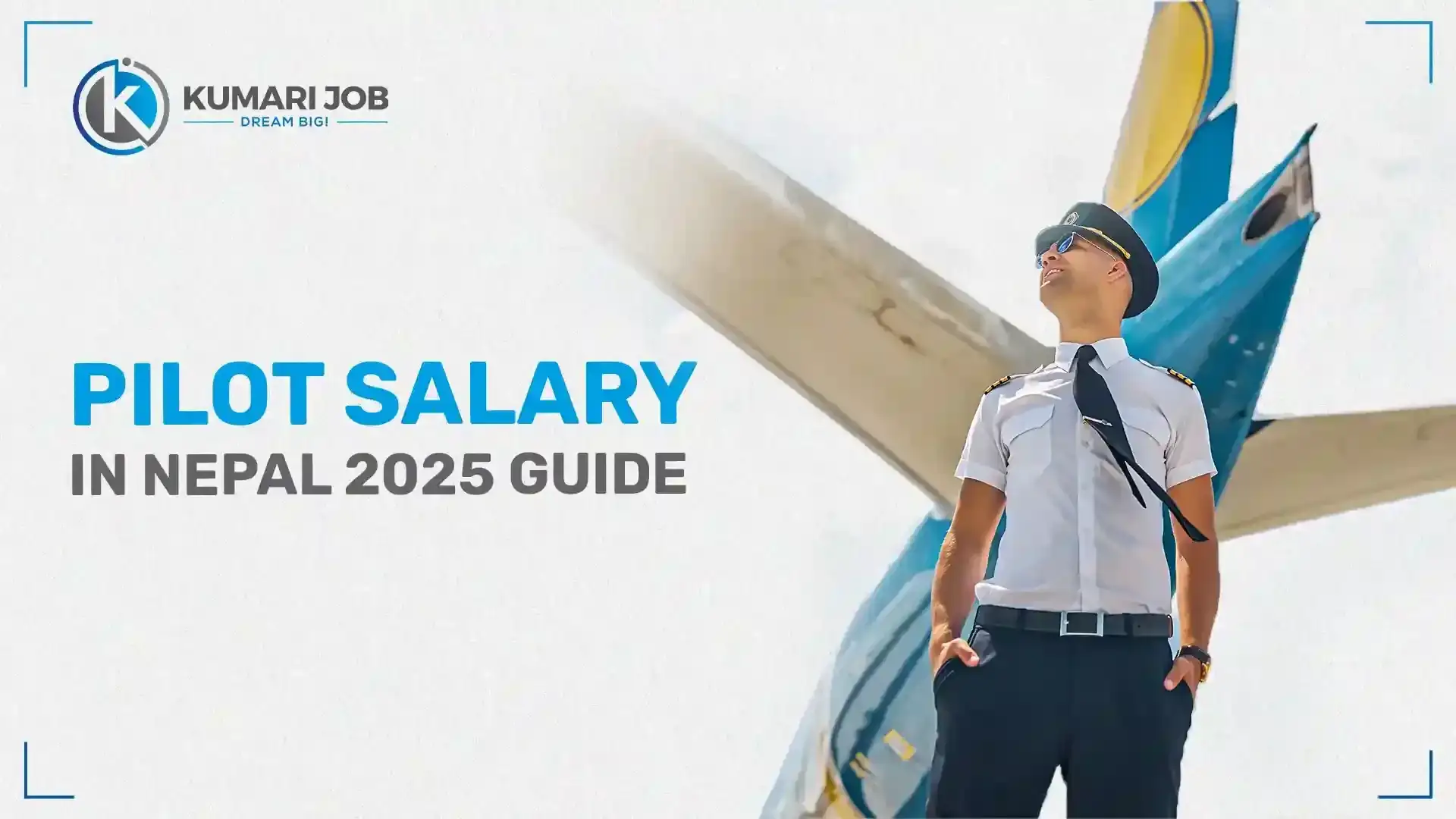
Have you ever imagined yourself flying an airplane and becoming a pilot? You are not alone. The majority of Nepali teenagers are now thinking about aviation as a promising and well-paying career. Pilots in Nepal can actually earn a good income, sometimes even lakhs of rupees per month! That's the reason people want to do it. Additionally, the profession also comes with respect, adventure, and travel.
But wait, how much do pilots actually earn in Nepal? And what does it take to become one? In this guide, you’ll learn everything in a simple way: pilot salaries, what affects pay, training schools, and more. If you’re thinking about flying as your career, keep reading. This could be your first step toward the sky.
In this blog
What is the Average Salary of a Pilot in Nepal?
The average salary of a pilot can range from NPR 25,000 to over NPR 15 lakhs per month, depending on experience, rank, and where they fly. It all depends on how far you’ve gone in your pilot career. Let's see the salary range in more detail:

1. Trainee Pilots (NPR 25,000 – NPR 50,000/month)
Trainee pilots are beginners. They usually fly with instructors or professional pilots. They do not receive that much money at this level as they are learning and gaining flight hours. Most Nepali trainee pilots get NPR 25,000 to NPR 50,000 per month. They even conduct free training at times just to achieve flying hours. All their worry is how to attain enough flight hours and improve skills.
The trainees can help during practice sessions or assist during real flights. This is a time to learn, and they earn a small amount of money, but it leads to better jobs. So, don’t worry too much about the pay while you are training. Higher pay comes after you finish training and get your license.
2. Junior First Officers (NPR 80,000 – NPR 2,00,000/month)
Once the pilot receives a Commercial Pilot License (CPL), they are eligible to work as a Junior First Officer. Popularly known as the fresher level. Salaries now rise, usually between NPR 80,000 and NPR 2,00,000 per month. They start flying real routes for national airlines here. They still fly under the guidance of the Captain. But the responsibilities are much bigger compared to training.
First officers follow all the flight procedures, checklists, and safety protocols. They also help with navigation, communication, and inspection of the aircraft. The actual salary depends on the airline, flying hours, and the type of aircraft they fly. Some pilots are paid even more if they make regular flights or take long-duration flights. It's a good start for fresh pilots who want to build a solid career.
3. Captains (NPR 4,00,000 – NPR 8,00,000/month)
Captains are the most senior pilots. They possess full authority over the plane. Their monthly salary is usually NPR 4 lakhs to NPR 8 lakhs. To become a Captain, a pilot would need to have many years of experience in flight and thousands of flight hours. They should also have an Airline Transport Pilot License (ATPL). It is the highest rating for pilots.
Captains make all important decisions during flight. They are responsible for the safety of passengers, crew, and aircraft. They usually get extra benefits like allowances, bonuses, and paid leave. Their pay is good, but so is their responsibility. However, for the majority, being a Captain is a dream fulfilled. It's the culmination of a pilot's career chart.
4. International Airline Pilots (NPR 10–15 lakhs/month or more)
Nepalese pilots working for international airlines are paid NPR 10 lakhs to 15 lakhs a month, sometimes even more. They are among the best-paid pilots. They fly larger aircraft like Boeing or Airbus. These flights take longer and are more challenging. But the benefits and compensation are good.
The majority of foreign pilots are provided with free accommodation, travel allowances, and even medical cover. Some are even provided with schooling assistance for children in the event that they are staying abroad. It takes a seasoned pilot to operate on this level, with increased licenses and capabilities. English language capability and international aviation are also required.
Summary Table of Pilot Salary Ranges
Pilot Level | Monthly Salary (NPR) |
| Trainee Pilot | 25,000 – 50,000 |
| Junior First Officer | 80,000 – 2,00,000 |
| Captain | 4,00,000 – 8,00,000 |
| International Airline Pilot | 10,00,000 – 15,00,000+ |
What Factors Affect a Pilot's Salary in Nepal?
A pilot's salary in Nepal is highly affected by their overall experience, type of aircraft, the company they fly for, and the kind of license they hold. While some pilots get as little as NPR 25,000 per month, others get over NPR 15 lakhs. That huge variation is due to a lot of factors. It's not just about gaining a license. Your flight hours, skill, and even the airline you are flying for all count a great deal. Let's break it down step by step.
1. Flying Time and Flying Experience
The more a pilot flies, the higher the pay. That's how the flying industry works. A beginner pilot has minimum flying experience in his or her logbook. Airlines thus pay them less because they require more actual flying practice. The more hours, either hundreds or thousands, the better and more reliable they become.
Experience counts when dealing with difficult situations, unfavorable weather, and crowded airports. That's why airlines prefer experienced pilots over others and compensate them accordingly. Some airlines also maintain a minimum flight hour rule before they can promote pilots to senior roles such as Captain.
2. Type of Aircraft (Twin Engine, Turbo-prop, Jet)
Not all planes are created equal, and neither are the salary packages for all pilots who fly them. Flying a small twin-engine plane does not pay as much as flying a large jet. This is because more advanced planes are more complex and need more training to fly. For example, flying a turboprop airplane for shorter routes is vastly different from flying a jet on cross-country flights. Jet pilots sometimes require specialized training and certification.
Airlines pay pilots more when they fly heavy and expensive airplanes. Why? Because the risk is higher, and the load is higher. So if you fly an average airplane, you get paid less. But if you're capable of flying advanced jets, your pay goes up quickly.
3. Domestic vs. International Airlines
Where you fly also affects how much you're paid. Domestic air pilots fly within Nepal. They make short flights, and the timetable is often tighter. They are paid decently, but not very well. The international airline pilot flies between countries. They make longer flights and sometimes even get overnight in the town or country. That is why they get paid a lot more.
International airlines also offer improved welfare, such as accommodation, travel allowance, and medical insurance. However, the work is tougher. Many Nepali pilots want to work for airlines in places like Qatar, UAE, or Singapore because they pay well. So, flying internationally means getting a good salary.
4. Licenses (PPL, CPL, ATPL) and Certifications
The license that you hold directly influences your salary. A Private Pilot License is only for training or as a hobby. With that alone, you cannot work as a paid pilot. A Commercial Pilot License enables you to work as a paid pilot. This is what the majority of the freshers are given after training.
And lastly, there's the ATPL or Airline Transport Pilot License. It's the maximum license that a pilot can get. You need it to become a Captain and fly big commercial airplanes. The higher your license level, the more you get paid. Further certifications, like instrument rating or type-rating for some planes (like Airbus or Boeing), push your wages up as well.
5. Airline Company (Nepali vs. Foreign Carriers)
Where you are at the airline company matters a lot as well. Some of the Nepalese airlines pay low salaries, especially to new pilots. Others, including Buddha Air or Yeti Airlines, pay good wages and offer prospects for advancement. Foreign airlines, however, pay much better. These are Middle Eastern, Southeast Asian, or European airlines.
They not only pay well, but also have good working conditions, bonuses, and other benefits. But working for a foreign airline is quite tough. You need higher flying hours, the best licenses, and sometimes complete worldwide tests. However, many Nepali pilots dream of flying for foreign airlines because it takes their salary and career to the next level.
What Qualifications and Skills are Required to Become a Pilot in Nepal?
To become a pilot in Nepal, you have to study +2 Science with Physics and Math, obtain suitable licenses like PPL and CPL, get medical checks, and gain technical as well as soft skills. It is not just about aircraft; you need to pass on the correct educational level, physical standards, and training. Let us make it clear so that you understand what it entails precisely.

1. Basic Requirements: +2 Science with Physics and Math
The first thing is education. You have to do your +2 (Grade 12) in the Science stream. Physics and Math are compulsory subjects. Why these two? Flying an airplane involves a lot of calculations, speed, direction, pressure, and a technical mind. Physics and math show you how planes fly in the air.
If you did not study science at school, you cannot apply for pilot training, at least in Nepal. After +2, one can start applying for flying colleges or aviation academies. Some students also take extra English or computer classes to prepare themselves. It makes training later on easy.
2. Licenses: PPL, CPL, and ATPL
Licenses are the most important part of being a pilot. Without licenses, you cannot fly. First is PPL (Private Pilot License). It's for beginners. It permits you to fly small planes, but not for a wage. It's similar to studying how to fly. Then there is CPL (Commercial Pilot License). This permits you to fly for payment. With CPL, you can fly for airlines as a First Officer or Co-Pilot. Most Nepalese new pilots work at this level.
Once you gain experience and flight hours, you can go for ATPL (Airline Transport Pilot License). It's the highest one. You need this to be a Captain and fly bigger planes. Each license has its own tests, flight training hours, and written examinations. The higher the license, the better your pay and job prospects.
3. Technical Skills: Aviation Theory, Navigation, Meteorology
Pilots need technical knowledge. It's not just about using buttons and levers. You need to understand how the aircraft works, how to navigate, and how to read the weather. Aviation theory will teach you the physics of flight. You will see how lift, drag, thrust, and weight affect an aircraft. Navigational skill allows you to stay on track in the air. Pilots use charts, instruments, and computer systems to reach the destination safely. Meteorology (weather study) is also required. Clouds, storms, winds, and visibility are all concepts that pilots must understand. Bad weather is hazardous, so you'll need to use your head. These technical skills are acquired in pilot training, and you'll keep developing them throughout your life.
4. Soft Skills: Decision-Making, Communication, Leadership, Stress Management
Being a pilot is not all about flying. You need a good mindset and attitude as well. Decision-making has to be fast, especially in emergencies. That is why decision-making is absolutely vital. You will also need to have good communication with air traffic control, co-pilots, and cabin staff. A misplaced word can create confusion.
Becoming a captain requires leadership. You will be in charge of the flight crew and accepting full responsibility. And, naturally, stress management. Flights may get delayed, weather may change rapidly, and someone may fall ill. With a calm and focused mind, everyone is safe. All these soft skills keep you professional, on track, and reliable.
5. Medical Fitness: Class 1 Medical Fitness Certificate
Your body and mind have to be fit to become an aircraft pilot. That's why you need to pass a Class 1 medical fitness test. This test checks your vision, hearing, heart rate, mental state, etc. Even small issues can disqualify you from flying.
The Civil Aviation Authority of Nepal is the authorized medical examiner. You'll be given a Class 1 medical certificate if you pass. This is required before pilot training can commence. The test is strict since safety first is the principle regarding aviation. You'll also need to renew the certificate from time to time in order to keep flying.
Where to Get Pilot Training in Nepal and Abroad?
You can get pilot training in Nepal or other countries. Good choices in Nepal are the Civil Aviation Academy and the Buddha Air Flight Academy. You can also choose to train in the Philippines, South Africa, the USA, or India. Each place has its pros and cons. What matters most is the quality of training, total cost, and whether the license is acceptable in Nepal. Let's talk about these options in detail.
1. Civil Aviation Academy (Nepal)
This is Nepal’s government-run training center for aviation. It is located in Kathmandu and operated by the Civil Aviation Authority of Nepal (CAAN). The academy mainly trains air traffic controllers, engineers, and pilots. For those who want to become a professional pilot in Nepal, this is a trusted place. The biggest benefit is that the training follows Nepali aviation rules. That means your license will be accepted directly by CAAN.
The trainers are experienced, and students get sufficient exposure to real-time flying and classroom sessions. The seats are limited, and admission is not straightforward. The training cost is also a bit more. Still, several successful pilots in Nepal started from here. If you like studying in your home country and following local rules and regulations, this is a suitable choice.
2. Buddha Air Flight Academy (Nepal)
This is a private flying school operated by Buddha Air. The academy is located in Bharatpur, Chitwan. It offers professional flight training to students aspiring to be commercial pilots. A major benefit here is the opportunity to fly aircraft of Buddha Air and potentially get employed within the company in the future.
The aircraft, flight simulators, and instructors at the school are satisfactory. They even provide preparation for license exams for the students. Training is specialized, highly structured, and designed to meet the needs of the aviation sector in Nepal. It's a bit expensive, but you get good quality in return. Plus, since it's run by an airline company, students can get real exposure. In case you're planning to stay and work in Nepal, this is a great option to consider.
3. Abroad (Philippines, South Africa, USA, India, etc.)
Many Nepali students also go abroad for pilot training. The Philippines, South Africa, the USA, and India are a few of the favored destinations. One main reason is the lower cost—some countries offer cheaper training than in Nepal. Moreover, you can fly in different weather and airspace conditions, which builds stronger skills. For example, the Philippines is affordable and offers training in English. South Africa has great weather and a long flying season. The USA has world-class flight schools and advanced technology.
However, after training abroad, your license may not be directly accepted in Nepal. You’ll need to convert it through CAAN, which includes tests and extra paperwork. That's why you have to choose a CAAN-approved school, or a school with a good international reputation. Foreign training is great for exposure and experience, but you will have to plan ahead for license conversion and job hunting in Nepal.
Career Growth Opportunities for Pilots in Nepal
You will start your aviation journey as a student or a trainee. Here, you primarily learn and build your flying hours. You may assist other experienced pilots, have theory classes, and fly under the guidance of instructors. The salary here is very minimal or zero. However, this level is essential to gain your first license and real experience. With experience and increased flying hours, you can get promoted to senior first officer and even captain.
1. Junior First Officer (Co-Pilot)
Once you hold your Commercial Pilot License (CPL), you are able to apply to airlines as a Junior First Officer. That is your first real flying job. You are seated in the cockpit and flying the aircraft, but always with a Captain present. You gain loads of experience during this time, including how to deal with real flights, how to deal with passengers, how to deal with weather, and how to deal with airline procedures. Your pay now starts to rise. Most pilots stay in this rank for two years to build up experience.
2. Advance to Senior First Officer
After you've been flying for two years and have earned more flight hours, you will be advanced to Senior First Officer. Now you are freer with flights. You still continue flying under a Captain, but you can be more in control while flying. You can also fly bigger or more advanced planes. With this level, your skills improve, confidence levels rise, and income rises.
3. Become a Captain
This is the dream of every pilot. In order to become a Captain, you need thousands of flight hours, a clean performance record, and an ATPL (Airline Transport Pilot License). Being a Captain, you are completely in charge of the aircraft. You are in command of the entire flight operation, make key decisions, and lead the team. Your pay is now among the highest-paid jobs in Nepal's aviation sector. Captains also receive respect from their crew, airline, and passengers. It's a big responsibility and also a proud achievement.
4. Scope of International Airlines
Once you gain good experience here in Nepal, you may also apply to international airlines. Middle Eastern, Southeast Asian, and even European airlines often hire talented Nepali pilots. Foreign salaries are much higher, sometimes 10 to 15 lakhs a month. You may require some extra training or license conversion. But several Nepali pilots have set up successful careers outside Nepal, too.
5. Other Career Paths
Not every pilot wants to fly for their whole life. A few shift their career later into teaching and become flight instructors. Others get into management positions at airlines or flight schools. You can also work as a simulator trainer, examiner, or safety officer. These are less stressful but very lucrative. So even if you stop flying in the future, your experience might still help you develop in other areas of aviation.
Is Piloting a Good Career in Nepal?
Yes, being a pilot is a good career choice in Nepal, especially if you enjoy flying and are willing to invest in training. It also comes with a high salary, a lot of respect, and the perk of traveling. But it's competitive, too, and demands total commitment. Let's explore what makes this career worth considering and what sort of challenges it presents.
1. High Earning Potential After Investment in Training
It is expensive to become a pilot first. Training ranges from 25 to 40 lakhs or even higher if it is overseas. It may look expensive. But once you have become a licensed pilot and started flying on a regular basis, your income starts growing very fast. Even as a beginner, you can earn NPR 80,000 to NPR 2,00,000 per month. Senior captains and pilots take home 4–8 lakhs every month. And international flights receive 15 lakhs or even more. So, yes, the return on your investment in training is great in the long term. It may take 3–5 years to recover the amount in full, but then you are earning high profits.
2. Prestige and Respect in the Community
Pilots are respected workers in Nepal. It's a job that people admire. When others learn you are a pilot, they look up to you. Parents feel proud, friends are impressed, and society sees it as a job that needs skill, hard work, and courage. This respect increases as you advance in your career, from being a trainee to becoming a captain. Not many can say they fly planes for a living. Piloting is also seen as a safe and steady job. Whether you fly within the country or internationally, people appreciate your work. If you want both respect from others and a good job, being a pilot can give you both.
3. Exciting Work with Travel Opportunities
Being a pilot is not a boring office job. Each day is different. You get to fly to new places, meet new people, and see the world from the sky. Even flying in Nepal takes you to beautiful spots like Pokhara, Lukla, or Nepalgunj. International pilots go to new cities and countries. You will spend time in airports, hotels, and different places. It's a dream job for those who love to travel and see new sights. There is no regular 9-to-5 schedule and no traffic jams in the morning. Sometimes the job can be tiring. Overnight flights, late shifts, and delays due to weather happen. But most of the time, the excitement of flying is worth it.
4. Attractive Job Market but Growing Aviation Sector
Nepal's aviation industry is growing slowly but steadily. More airlines are adding planes and starting new routes. This means there are more flying jobs, but there are also more people wanting to be pilots. So, it is competitive. Getting a job depends on your license, training, flying hours, and how well you do in interviews. Airlines want pilots who are calm, smart, and well-trained. Although there is competition, it's possible to get a job. Nepali pilots are finding jobs abroad because of their good training. As your career grows, your chances of getting hired will increase. If you prepare and wait, you will get your chance.
Conclusion
Becoming a pilot in Nepal can be a rewarding career, offering both financial stability and personal fulfillment. Trainees can earn about NPR 25,000 a month, while experienced pilots can make over NPR 15 lakhs a month with international airlines. Your salary can vary based on your experience, the type of plane you fly, your licenses, and the airline you work for. Although training to become a pilot costs a lot and takes time, the benefits in the long run make it worth it.
Pilots in Nepal can earn a lot, grow in their careers, and have a good reputation. The job also allows for travel and working in different environments. If you are passionate about flying and ready to invest in your training, being a pilot can lead to a successful future in Nepal and other countries.












Loading Comments...